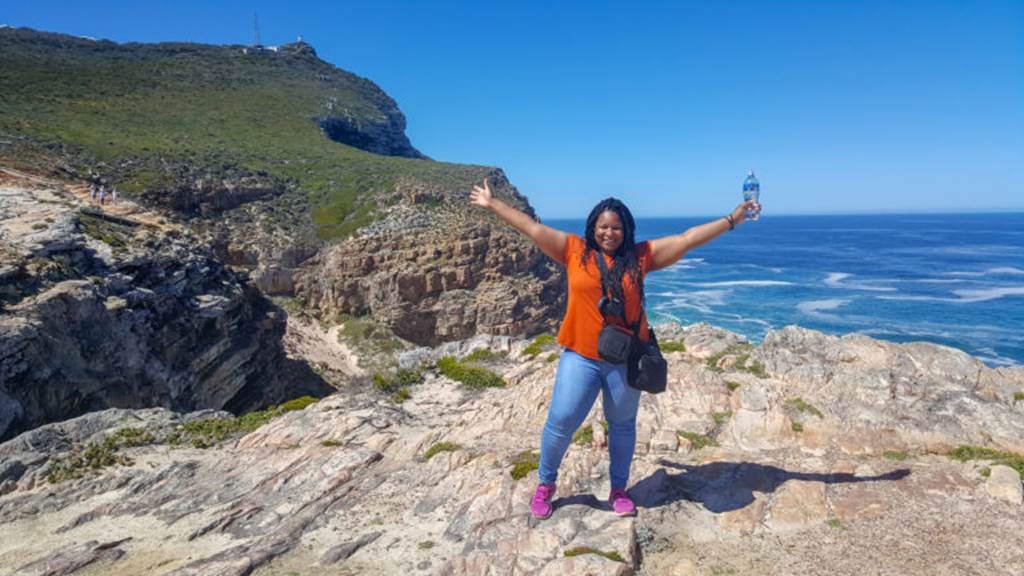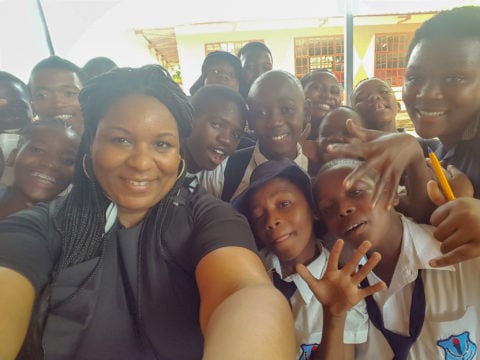Fulbright Winner Recaps Africa Excursion
10 December 2018
Scenecia Curtis, a South Shore International High School English teacher, began her journey in January of 2018 and was able to fulfill her dream of living and working in another country when she spent six months in Botswana, Africa.

Scenecia Curtis, a South Shore International High School English teacher, says an opportunity of a lifetime all began with a simple post on Facebook.
She says she’d always dreamed of traveling internationally, but that wasn’t enough. After visiting Norway a few years ago for a spring break trip, she wanted to “see more, to experience more.”
Curtis said the feeling never went away, so one day she posted a question on Facebook: ‘How can I live and work in another country?’
Her former Chicago State University professor commented with one short sentence: “Try Fulbright.”
Curtis decided to take her chance and apply, and, to her surprise, she was named a recipient of the Fulbright Distinguished Award. It’s a professional development program for teachers. She began her journey in January of 2018 and was able to fulfill her dream of living and working in another country when she spent six months in Botswana, Africa.
For four months she explored the best practices of Botswana’s secondary literature and language teachers’ use of literature and literacy to promote social justice and leadership among Botswana’s youth.
We sat down with her to discuss her 14 years of teaching, her time in Botswana, and how she hopes to inspire the next generation of leaders.
Answers have been edited for length and clarity.
Q: How did you first find out about the Fulbright Program?
A: My college professor influenced me to apply after I posted on my Facebook page, ‘How can I live and work in another country?’ I researched the Distinguished Teaching Award, and I had just missed the deadline. So, I put it on my radar for the next application window.
As soon as the window opened again, I created a project, applied, and I just let it go. I didn’t know what would happen. I didn’t expect that I would get selected.
Q: What is the application process like for the Fulbright Distinguished Teacher Award?
A: Rigorous. It allows people to focus on marginalized groups, including our students. Through that process, you are also tapping into the experiences of teachers and students in other countries, so, you have to design a project that not only students in the US can benefit from, but students in other countries.
Q: How did you feel when you made it to Botswana and started your journey?
A: As an African American woman, it has always been a dream of mine to go back to Africa. I didn’t know how, but I knew I’d always wanted to go. So, it was a blessing to receive the Fulbright Award. I thought that when I landed I would cry, but I’m a very reflective person. It was just a quiet appreciation for the opportunity to represent my district, my school, and learn and embrace the culture.
Q: What was an average day like for you in Botswana?
A: The first two weeks I went to teacher workshops at 8 a.m. I worked with teachers until about 3 p.m. I spent time supporting teachers around redesigning their curriculum. Botswana is in the process of revamping their English curriculum, so I was blessed to be a part of that experience.
Outside of that, I would visit schools, interview teachers and students, and collect data on my own research project. I talked to students about what they were learning in class, how the topics helped in their daily lives, and struggles they experienced. On several occasions, I co-taught with teachers and traveled to different cities to share CPS’ best practices.
Q: You’ve been a teacher for about 14 years now. When did you develop an interest in education?
A: I always knew that I wanted to be a teacher, but I think what first interested me was my ability to connect with young people who had similar experiences as I did growing up; specifically living in Chicago in impoverished neighborhoods with limited access to basic needs.
I grew up in a similar environment as some of my students, and I spent a lot of time writing about my experiences. That is what encouraged me to pursue a career in education with a focus in English.
Q: What differences did you notice between Botswana’s education system and CPS?
A: The character was central to the curriculum. The professional work that I engaged in there centered around how to create and develop the students we would like to see in our country now and for years to come. When we write the curriculum, or when we plan our lessons, sometimes we miss that.

Curtis with Bokamosa Junior Secondary School students
Q: You say on your website that your philosophy as an educator is to “advocate for equitable access in education for all students despite their gender, academic, ethnic, socioeconomic, and religious backgrounds.” How do you apply that philosophy in your classroom every day?
A: One thing that I try to expose my students to is a rigorous learning experience. A lot of people assume that certain groups of students are not capable of having access to rigorous learning experiences. On a daily basis, I am engaging students in complex discussions, and I am getting them to apply a lot of the concepts in class to real-world experiences. My purpose for each unit is to answer the question, ‘So, now what? What can we do with the information that we have? What are our next steps in our lives and in our communities?’
Q: As a Fulbright award recipient, you had to choose a topic to research in Botswana that could then be applied to the district. You chose to identify best practices of Botswana’s secondary literature and language teachers’ use of literature and literacy to promote social justice and leadership among Botswana’s youth. How did you choose that topic?
A: As a young African American woman, I grew up facing a lot of hardships. I didn’t see the classroom as a place for students to address some of their own experiences. We have a responsibility as educators to prepare our students and our country for growth, especially with some of the issues that our students are encountering right now. I wanted to focus on figuring out ways to provide a solution to the things that they are encountering so years from now, maybe those problems will be lessons. The classroom is a place to make that happen.
Q: What was your most memorable moment during your time as an educator in Botswana?
A: My sophomore year in high school, I had my daughter. As someone who was once a teen mom, I wanted to learn about the support that Botswana was providing for young mothers. A lot of the young moms in Botswana drop out of school because they don’t have the finances or they don’t have a sitter. I found a program for teen moms in Botswana, and, in the first meeting, I met with young mothers to discuss the struggles they had. It was a little support group, and I was able to speak about my experiences to encourage the young ladies to go to school.
Q: What lessons were you able to bring back home from Botswana?
A: My time in Botswana increased my abilities and belief in myself, so I am able to empower my students. I try to empower them to feel that they are capable and able to change the flaws of the world that we live in. What I try to do is make the students feel that they can do anything and that their voices are important, even in small circumstances.
Q: What’s next for you?
A: I created a unit that includes Botswana and Chicago poets discussing cross-cultural issues. I want to spread this lesson to Botswana so that our students can engage in cross-cultural conversations. I hope to use the poetry to then inspire students to write their own in order to inspire change. I want to eventually create an anthology with the work from both groups of students.
Q: How do you hope to inspire future educators now that you’ve completed your Fulbright experience?
A: A lot of teachers of color are not aware of the Fulbright program, and they may not think to apply. As an African American woman, being a Fulbright recipient in an urban school on the South Side of Chicago, where I grew up and where I teach, it’s important to reach marginalized students. I hope my story encourages people to apply for Fulbright because it is a great outlet for change in our community.
Related Stories
25 April 2025
Taking a Leap of Faith: First-Year AP Shares Her Journey to School Leadership
AP Jordan thrives in leading with compassion and love each and every day.
18 April 2025
Celebrating Mariachi in Music Class: Take Five with Phillip Olazaba
Mr. Olazaba is known for being a caring teacher who has high expectations while still making learning fun.
18 April 2025
Learning All About a Wonderful Special Education Classroom Assistant at Skinner North Classical School
Ms. Boonstra has found a great fit as a special education classroom assistant.
17 April 2025
Introducing Trevor Nicholas: Golden Apple Finalist for Excellence in Teaching
Mr. Nick likes to remind himself that "hurry is often the opposite of love" when teaching music to students as a vehicle for healing.




